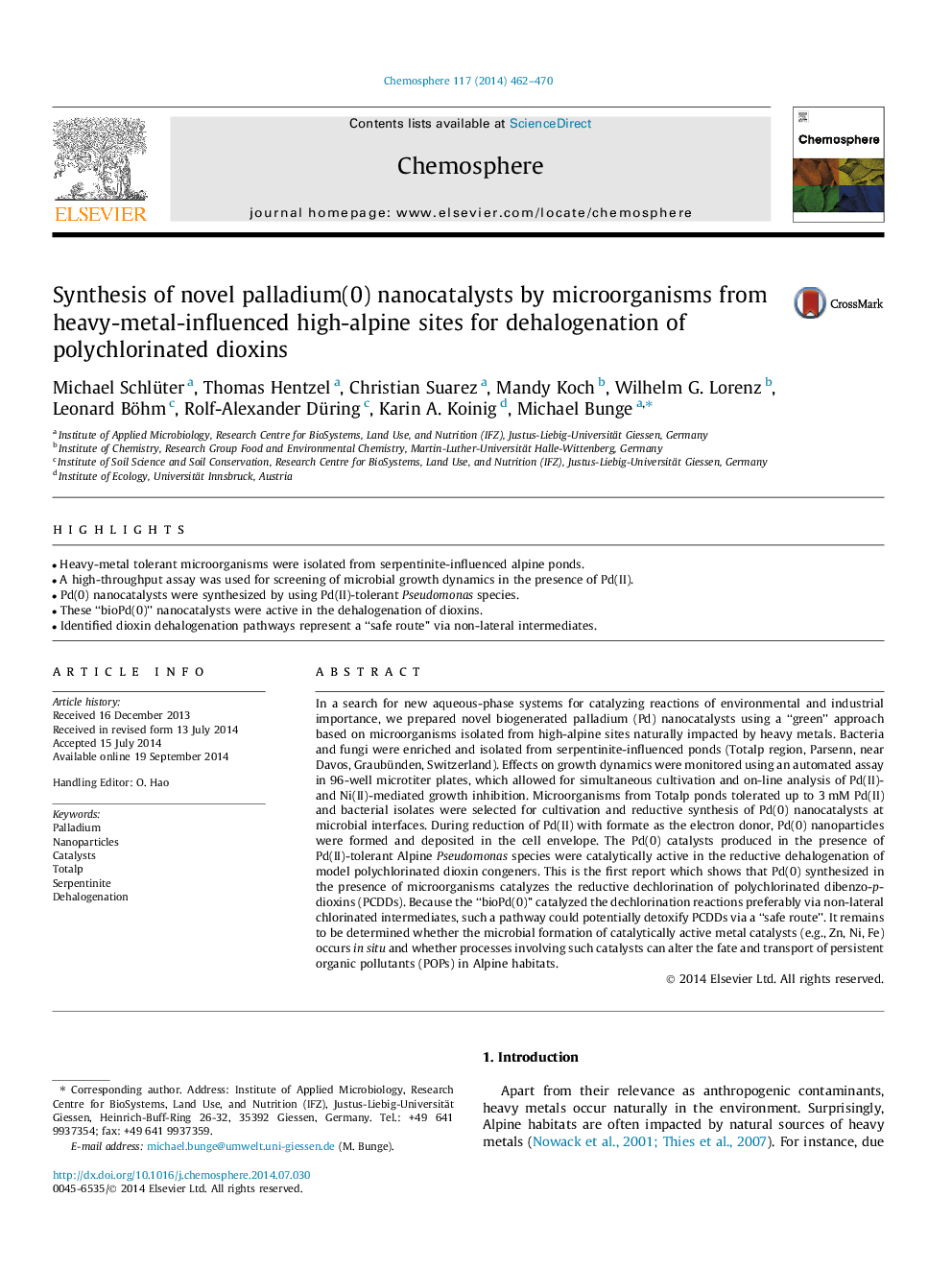| کد مقاله | کد نشریه | سال انتشار | مقاله انگلیسی | نسخه تمام متن |
|---|---|---|---|---|
| 6308489 | 1618854 | 2014 | 9 صفحه PDF | دانلود رایگان |
عنوان انگلیسی مقاله ISI
Synthesis of novel palladium(0) nanocatalysts by microorganisms from heavy-metal-influenced high-alpine sites for dehalogenation of polychlorinated dioxins
ترجمه فارسی عنوان
سنتز نانوکاتالیزورهای جدید پالادیوم (0) توسط میکروارگانیسم ها از مناطق آلپ بالا تحت تاثیر سنگین فلز برای تخلیه دی اکسین های پلی کربنات
دانلود مقاله + سفارش ترجمه
دانلود مقاله ISI انگلیسی
رایگان برای ایرانیان
کلمات کلیدی
موضوعات مرتبط
علوم زیستی و بیوفناوری
علوم محیط زیست
شیمی زیست محیطی
چکیده انگلیسی
In a search for new aqueous-phase systems for catalyzing reactions of environmental and industrial importance, we prepared novel biogenerated palladium (Pd) nanocatalysts using a “green” approach based on microorganisms isolated from high-alpine sites naturally impacted by heavy metals. Bacteria and fungi were enriched and isolated from serpentinite-influenced ponds (Totalp region, Parsenn, near Davos, Graubünden, Switzerland). Effects on growth dynamics were monitored using an automated assay in 96-well microtiter plates, which allowed for simultaneous cultivation and on-line analysis of Pd(II)- and Ni(II)-mediated growth inhibition. Microorganisms from Totalp ponds tolerated up to 3Â mM Pd(II) and bacterial isolates were selected for cultivation and reductive synthesis of Pd(0) nanocatalysts at microbial interfaces. During reduction of Pd(II) with formate as the electron donor, Pd(0) nanoparticles were formed and deposited in the cell envelope. The Pd(0) catalysts produced in the presence of Pd(II)-tolerant Alpine Pseudomonas species were catalytically active in the reductive dehalogenation of model polychlorinated dioxin congeners. This is the first report which shows that Pd(0) synthesized in the presence of microorganisms catalyzes the reductive dechlorination of polychlorinated dibenzo-p-dioxins (PCDDs). Because the “bioPd(0)” catalyzed the dechlorination reactions preferably via non-lateral chlorinated intermediates, such a pathway could potentially detoxify PCDDs via a “safe route”. It remains to be determined whether the microbial formation of catalytically active metal catalysts (e.g., Zn, Ni, Fe) occurs in situ and whether processes involving such catalysts can alter the fate and transport of persistent organic pollutants (POPs) in Alpine habitats.
ناشر
Database: Elsevier - ScienceDirect (ساینس دایرکت)
Journal: Chemosphere - Volume 117, December 2014, Pages 462-470
Journal: Chemosphere - Volume 117, December 2014, Pages 462-470
نویسندگان
Michael Schlüter, Thomas Hentzel, Christian Suarez, Mandy Koch, Wilhelm G. Lorenz, Leonard Böhm, Rolf-Alexander Düring, Karin A. Koinig, Michael Bunge,
